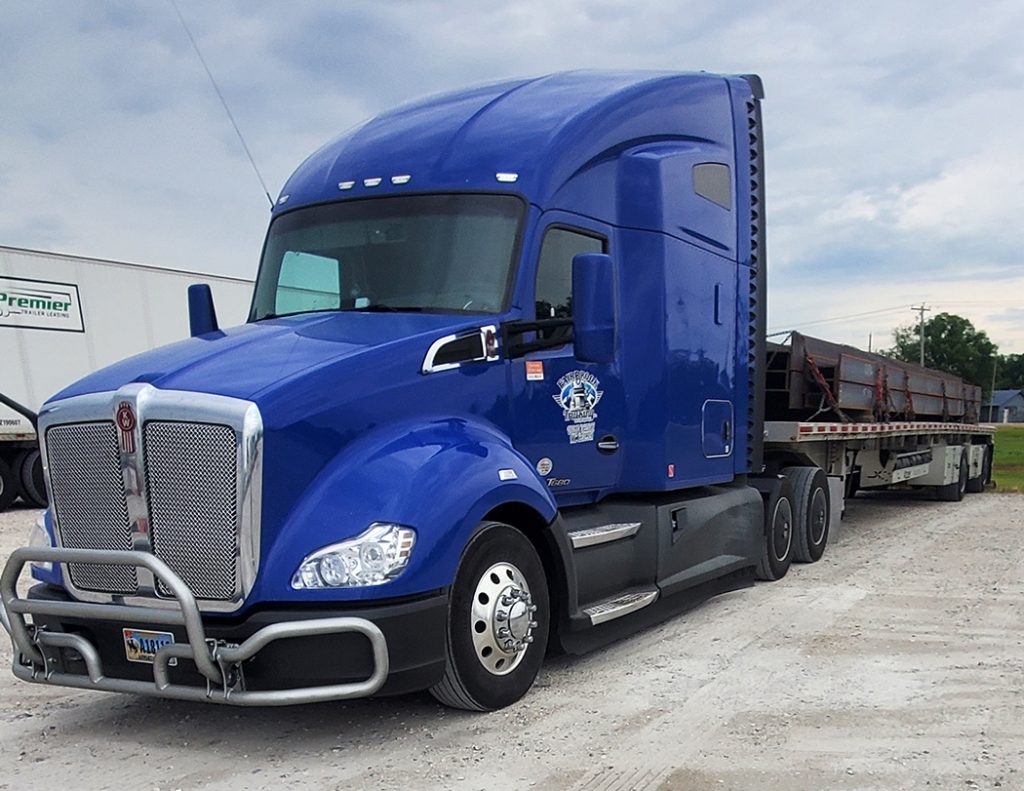
In the ever-evolving world of trucking, where fuel efficiency and environmental consciousness are paramount, the 2020 Kenworth T680 stands out as a great example of good design and impressive performance. This article delves into the results of a 33-day real-world test conducted on a meticulously equipped T680 by our good friend, Cole Fairbrook, showcasing not only its fuel efficiency capabilities, but also highlighting the exciting potential for further optimization. The complete numbers are provided.
The subject of this test was a 2020 Kenworth T680 with a 228” wheelbase, powered by the Paccar MX-13 engine, paired with a 12-speed automated manual transmission (AMT), and 2.64 rears. This configuration, combined with a 6×4 drivetrain, trailer wide-base tires, fuel additives (Max Mileage FBC and Flashpoint), wheel covers, FASS fuel system, Fleet Air Filter, and eco mud flaps on both the truck and trailer, was specifically designed to maximize fuel efficiency. The truck also incorporated various upgrades like PS-386 transmission oil, Rotella T5 10W30 engine oil with FR3, and FE 75W90 gear oil, further optimizing its performance.
Over the span of 33 days, the T680 traversed a distance of 14,419 miles, carrying an average of 24,450 pounds of freight, or a gross vehicle weight of 57,350 pounds. The truck predominantly operated at 55 mph, with three days of driving at a faster 64 mph. All 55 mph driving was done in direct drive at 1,240 rpm and all 64 mph in overdrive at 1,100 rpm. The results are clear: the T680 achieved an average fuel economy of 10.14 mpg, consuming a total of 1,422 gallons of diesel. This remarkable figure demonstrates the truck’s ability to translate its design features into real-world savings.
The T680 doesn’t just excel in fuel efficiency, it also sets a high standard in sustainability. The test revealed a commendable DEF (Diesel Exhaust Fluid) consumption rate of 314 mpg. This indicates the truck’s strong commitment to minimizing emissions while still delivering robust performance, reinforcing its dedication to sustainability and environmental responsibility.
While the T680 already demonstrated impressive fuel efficiency, the owner recognizes that there’s always room for more improvement. Further optimization through modifications such as steer tire covers, trailer side skirts, flow-below devices, and differential oil upgrades is estimated to increase fuel efficiency by an additional 11.2%, potentially pushing the T680 to an impressive 11 mpg.
The owner also acknowledges the ongoing discussion within the industry regarding the relative performance of different engine makers, particularly the Paccar MX-13 and the Cummins X15. While the Paccar MX-13 generally achieves a 1 mpg advantage over the Cummins X15, the Cummins has the benefit of aftermarket tuning capabilities, which would potentially allow it to achieve comparable levels of fuel efficiency. The owner believes that a Cummins X15 could also achieve 10 mpg or more with the right modifications and tuning.
The T680’s success story highlights the importance of a full and comprehensive approach to fuel efficiency. The owner emphasizes that it’s not just about the engine make or model, but also a carefully chosen combination of components, modifications, and driving tactics. This holistic approach, involving upgrading oils, installing fuel system enhancements, adding aerodynamic components, and implementing fuel additive programs, is crucial for achieving significant fuel efficiency gains and is a key knowledge for anyone in the trucking industry.
This real-world test of the Kenworth T680 not only showcases the power of customization and optimization in achieving significant fuel efficiency gains, but also the truck’s impressive performance. As the trucking industry continues to evolve, the need for fuel efficiency and environmental consciousness will only intensify. The T680, with its remarkable performance and potential for further optimization, exemplifies how the industry can embrace these challenges and pave the way for a more sustainable future of transportation.
Here is some of the additional raw data of the test. The test was completed over a 33-day period (6/20/24 to 7/22/24). The truck drove 14,419 miles, burned 1,422 gallons of fuel, and obtained an average of 10.14 mpg. The DEF was used at a rate of 314 mpg. The average speed driven for 30 days was 55 mph (driven in direct drive at 1,240 rpm), and three days at 64 mph (driven in overdrive at 1,100 rpm). The average freight weight was 24,450 or 57,350 gross. The truck hauled 12 loads during the timeframe of the test, with an average length of haul at 1,106 miles, along with 1,114 deadhead miles. The testing was done personally by Cole Fairbrook.
I would like to thank my associate Jordan Greathouse for putting this article together and Cole Fairbrook for allowing us to share his results. This is not a promotional piece promoting the T680, but a real-world test, performed in real-world conditions, that shows how increased fuel mileage can happen without sacrificing power. Like it or not, folks, this is the future of saving fuel and staying legal, and a future all of you should start to accept and embrace. If you would like more information about this test or would like to schedule an appointment to upgrade your truck with some or all of these items, give us a call at (724) 360-4080 or visit us at www.pittsburghpower.com.
